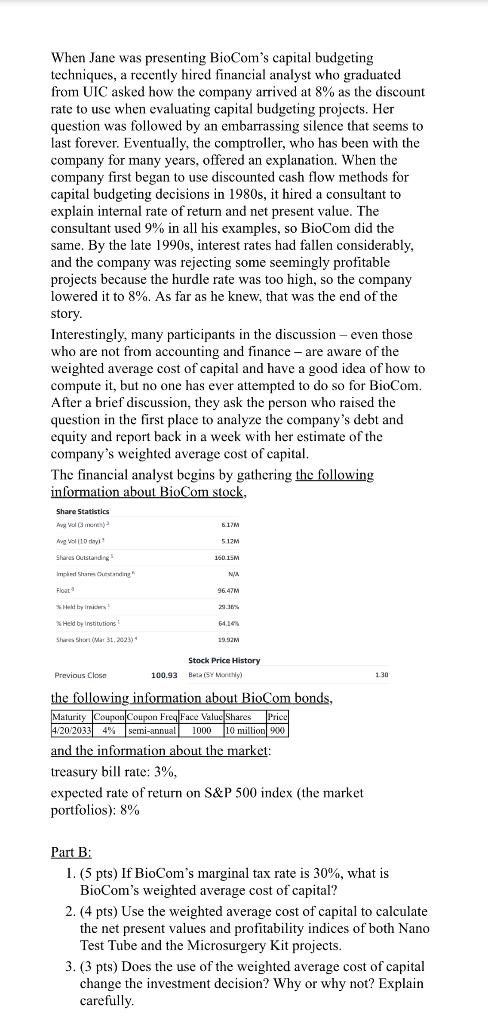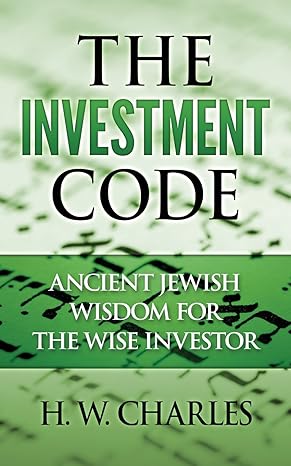Answered step by step
Verified Expert Solution
Question
1 Approved Answer
please solve using Excel and include all formulas When Jane was presenting BioCom's capital budgeting techniques, a recently hired financial analyst who graduated from UIC

please solve using Excel and include all formulas
When Jane was presenting BioCom's capital budgeting techniques, a recently hired financial analyst who graduated from UIC asked how the company arrived at 8% as the discount rate to use when evaluating capital budgeting projects. Her question was followed by an embarrassing silence that seems to last forever. Eventually, the comptroller, who has been with the company for many years, offered an explanation. When the company first began to use discounted cash flow methods for capital budgeting decisions in 1980s, it hired a consultant to explain internal rate of return and net present value. The consultant used 9% in all his examples, so BioCom did the same. By the late 1990s, interest rates had fallen considerably, and the company was rejecting some seemingly profitable projects because the hurdle rate was too high, so the company lowered it to 8%. As far as he knew, that was the end of the story. Interestingly, many participants in the discussion - even those who are not from accounting and finance - are aware of the weighted average cost of capital and have a good idea of how to compute it, but no one has ever attempted to do so for BioCom. After a brief discussion, they ask the person who raised the question in the first place to analyze the company's debt and equity and report back in a week with her estimate of the company's weighted average cost of capital. The financial analyst begins by gathering the following information about BioCom stock, and the information about the market: treasury bill rate: 3%, expected rate of return on S\&P 500 index (the market portfolios): 8% Part B: 1. (5 pts) If BioCom's marginal tax rate is 30%, what is BioCom's weighted average cost of capital? 2. (4 pts) Use the weighted average cost of capital to calculate the net present values and profitability indices of both Nano Test Tube and the Microsurgery Kit projects. 3. (3 pts) Does the use of the weighted average cost of capital change the investment decision? Why or why not? Explain carefully. When Jane was presenting BioCom's capital budgeting techniques, a recently hired financial analyst who graduated from UIC asked how the company arrived at 8% as the discount rate to use when evaluating capital budgeting projects. Her question was followed by an embarrassing silence that seems to last forever. Eventually, the comptroller, who has been with the company for many years, offered an explanation. When the company first began to use discounted cash flow methods for capital budgeting decisions in 1980s, it hired a consultant to explain internal rate of return and net present value. The consultant used 9% in all his examples, so BioCom did the same. By the late 1990s, interest rates had fallen considerably, and the company was rejecting some seemingly profitable projects because the hurdle rate was too high, so the company lowered it to 8%. As far as he knew, that was the end of the story. Interestingly, many participants in the discussion - even those who are not from accounting and finance - are aware of the weighted average cost of capital and have a good idea of how to compute it, but no one has ever attempted to do so for BioCom. After a brief discussion, they ask the person who raised the question in the first place to analyze the company's debt and equity and report back in a week with her estimate of the company's weighted average cost of capital. The financial analyst begins by gathering the following information about BioCom stock, and the information about the market: treasury bill rate: 3%, expected rate of return on S\&P 500 index (the market portfolios): 8% Part B: 1. (5 pts) If BioCom's marginal tax rate is 30%, what is BioCom's weighted average cost of capital? 2. (4 pts) Use the weighted average cost of capital to calculate the net present values and profitability indices of both Nano Test Tube and the Microsurgery Kit projects. 3. (3 pts) Does the use of the weighted average cost of capital change the investment decision? Why or why not? Explain carefullyStep by Step Solution
There are 3 Steps involved in it
Step: 1

Get Instant Access to Expert-Tailored Solutions
See step-by-step solutions with expert insights and AI powered tools for academic success
Step: 2

Step: 3

Ace Your Homework with AI
Get the answers you need in no time with our AI-driven, step-by-step assistance
Get Started


